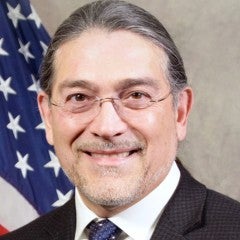Historically undercounted populations include Hispanics or Latinos, Black or African Americans, and renters, among others.
Santos, a Texas native who is the 26th director and the first Latino to lead the Census Bureau, was the forum’s featured speaker in conversation with Kinder Institute Director Ruth N. López Turley.
“We’ll reach new levels of excellence that could not have been achieved otherwise,” Santos said. “It’s not about numbers, because diversity, equity and inclusion are about changing the way you think about how you do your work, and valuing those diverse perspectives because it’s going to provide more accurate, more relevant data.”
When reflecting on the 2020 decennial census, Santos said that the COVID-19 pandemic made it apparent that the Census Bureau cannot complete the tally on its own. To make improvements to the 2030 census, the Census Bureau is launching a continuous engagement strategy that will interact with urban and rural communities most likely to be undercounted.
“We need community engagement. We need your help,” Santos said. “That means working with communities with a lot of resources at our disposal to engage, building trust, and working with previous partners in the Houston area like the Houston Endowment and the Texas Census Institute.
“We will be developing strategies so that we can really hone in on tailored approaches to different communities. It’s not a matter of one size fits all. Each community has a unique perspective and culture, and we want to be able to do our messaging and our methods in a way that matches that.”
Part of building that trust is tapping into existing resources and demonstrating the value of census data covering economic and demographic information. Santos said the bureau hopes to have community leaders encourage residents to highlight the benefits of completing the census.
“We are developing use cases so that we can give examples of how this data will help communities and that can help empower the trusted messengers to speak to people on the ground,” Santos said. “This data can absolutely help local community organizations understand their needs better, who their population is, and do good public health planning, disaster relief planning and infrastructure planning.”
Santos said the best possible information collected in a census is a self-response provided by a household. However, that is not the only way to be included.
“When we don’t get that, we send people out to knock on doors,” Santos said. “Sometimes people respond and they’ll participate, and other times they won’t. It’s a myth that people don’t always understand – failure to submit the census form doesn’t mean that you’re not counted. It means that we need to find some other way to fulfill our Constitutional obligation to enumerate all the population.”
An accurate count is important. According to the U.S. Census Bureau, Texas had an undercount of -1.92% in the 2020 census. This means Texas potentially lost out on $247 million in Medicaid reimbursements in 2021, for instance, according to an analysis by the Urban Institute.
The entire Kinder Institute Forum conversation is available below.


